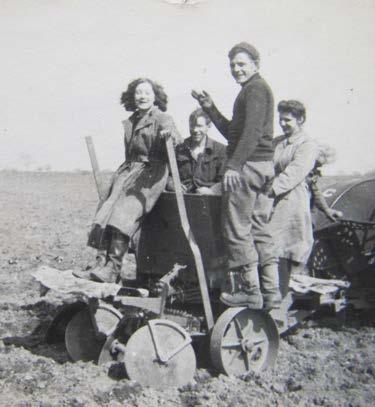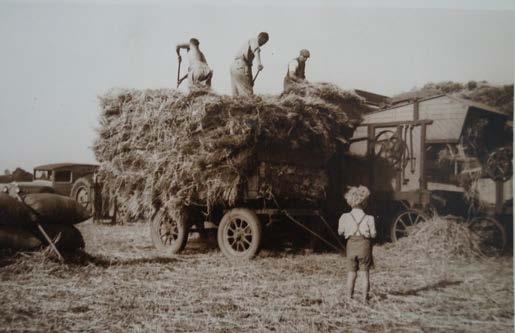
5 minute read
swords into ploughshares
from Wild Magazine Winter 2021
by essexwt
The Story of Frating Hall Farm
In 1943 a group of Christian pacifists took over Frating Hall Farm on the Essex Tendring peninsula, running it as a communal settlement until 1954. Soon more than fifty people lived and worked there, but the farm also provided accommodation for visiting supporters at harvest time, while offering sanctuary to refugees and former German prisoners-of-war. It was one of many rural initiatives providing recognised alternatives to conscription during the Second World War.
Many of those espousing pacifist sentiments in the 1930s themselves had direct experience of war, winning battle honours in the First World War. But having experienced the horrors of the trenches they realised there had to be a better way of serving the nation if war loomed again. One of those was Vera Brittain, whose heart-breaking memoir, Testament of Youth, recounting her work as a nurse on the front line, and the trauma of losing her fiancée, brother and two close friends in the carnage, made her for a while the conscience of the nation. She was a founding member of the Frating community, where her daughter, the young Shirley Williams - later a Labour Cabinet Minister - went to work there as ‘second cowman’.
The Quakers had been the first to support communal small-holding schemes in England after the ‘Great War’. Starting in Bedfordshire, the scheme came to north-east Essex in 1932, where it flourished under the auspices of the Land Settlement Association (LSA). In time Ardleigh, near Colchester, became a national stronghold of market gardening, remnants of which are evident in the glasshouses, vegetable plots, flower beds and orchards still in use. The Frating ‘experiment’ was, then, part of a wider back-to-the-land movement committed to the ethical stewardship of the land, as are many environmental and wildlife conservation projects in Essex once again today.
The young Shirley Williams, Derek Crosfield, Raymond Smith and Helen Johnson on the potato planter, Frating Hall Farm, 1948. By kind permission of the family of the late Joanna Dunn.


A young Martyn Thomas watches the unloading of sheaves into the threshing machine at Frating Hall Farm, circa 1950. He is still there today, seventy years later, part of the family partnership that runs the farm. By kind permission of Martyn & Barbara Thomas.
I first learned of Frating following a talk I gave at the 2019 Essex Book Festival on the county’s history of self-sufficient communities. Afterwards two women approached me saying they lived at Frating Hall Farm and invited my wife and I to visit and learn something of its unusual history. As a result, Martyn & Barbara Thomas - now owners of the farm, Martyn having been there from the beginning - helped me trace some of those who had grown up in the community. In No Matter How Many Skies Have Fallen: back to the land in wartime Britain, I tell the community’s story, based on tape-recorded reminiscences and private photos, letters and diaries, shared with me by those still alive.
Spurned initially by farming neighbours for their pacifist beliefs, the Frating community eventually won admiration for hard work and productivity on a 300 acre, arable and livestock farm. In addition to working the land, the community established a choir that toured local churches and a theatre group that staged plays in the ancient barn. The farm’s Harvest Suppers and seasonal festivities – choral concerts, folk dancing - became the stuff of local legend.
Despite the social isolation experienced by some adult members as a result of their beliefs, for their children, Frating was an enchanted garden. My now elderly interviewees recalled growing up with an extraordinary sense of freedom and happiness, coming and going into each other’s houses to eat or sleep, wandering the fields and woods when not at school, playing in the barn, feeding the animals, going on trips to the seaside on the back of a lorry, and much else. It was only in adult life that those I spoke to realised how difficult it had been for their parents, yet all remembered the community with pride in what had been attempted and for a while achieved.
‘Work on the land is necessary to the life of man in a way that no other work can be,’ wrote John Middleton Murry, whose writings inspired the Frating generation. Such sentiments are echoed today in books such as James Rebanks’ English Pastoral, or Isabella Tree’s Wilding: The Return of Nature to a British Farm, where the clarion call to return farming to an environmentally sustainable form of land stewardship and nature conservation is heard again. Another influential figure urging rural renewal is economist Sir Dieter Helm, government adviser on energy and natural capital, and Honorary Vice-President of the Berkshire, Buckinghamshire and Oxfordshire Wildlife Trust. In his recent report, Green and Prosperous Land: A Blueprint for Rescuing the British Countryside, Helm’s vision comes from personal experience. His father, a former German prisoner-of-war, interned and set to work on the land in East Anglia, ended up farming 350 acres of marshland in Essex, close to the River Blackwater. His son remembers it as a ‘mixed dairy and arable farm, with traditional farmyard chickens and ducks, a big vegetable garden, a small orchard and of course beehives.’
Yet after the father’s death in the 1960s, the title was sold to new owners who soon ploughed the 350 acres into a single field. For Helm this was a salutary lesson. Farming, nature conservation, wildlife protection and rural leisure are, he argues, all part of the same story. The Frating community knew this, and so do environmentalists again today.

Ken Worpole
For more about Ken’s book, No Matter How Many Skies Have Fallen: back to the land in wartime Britain,go to: www.littletoller.co.uk.
Ken Worpole photo: Larraine Worpole
Ken Worpole is a writer and social historian, with a particular interest in the history of Essex in the 20th century.
Watch a film of Ken Worpole in conversation with writer and historian Patrick Wright. Just search for 'Unfamiliar Territories Ken Worpole' on YouTube or scan the QR code:






